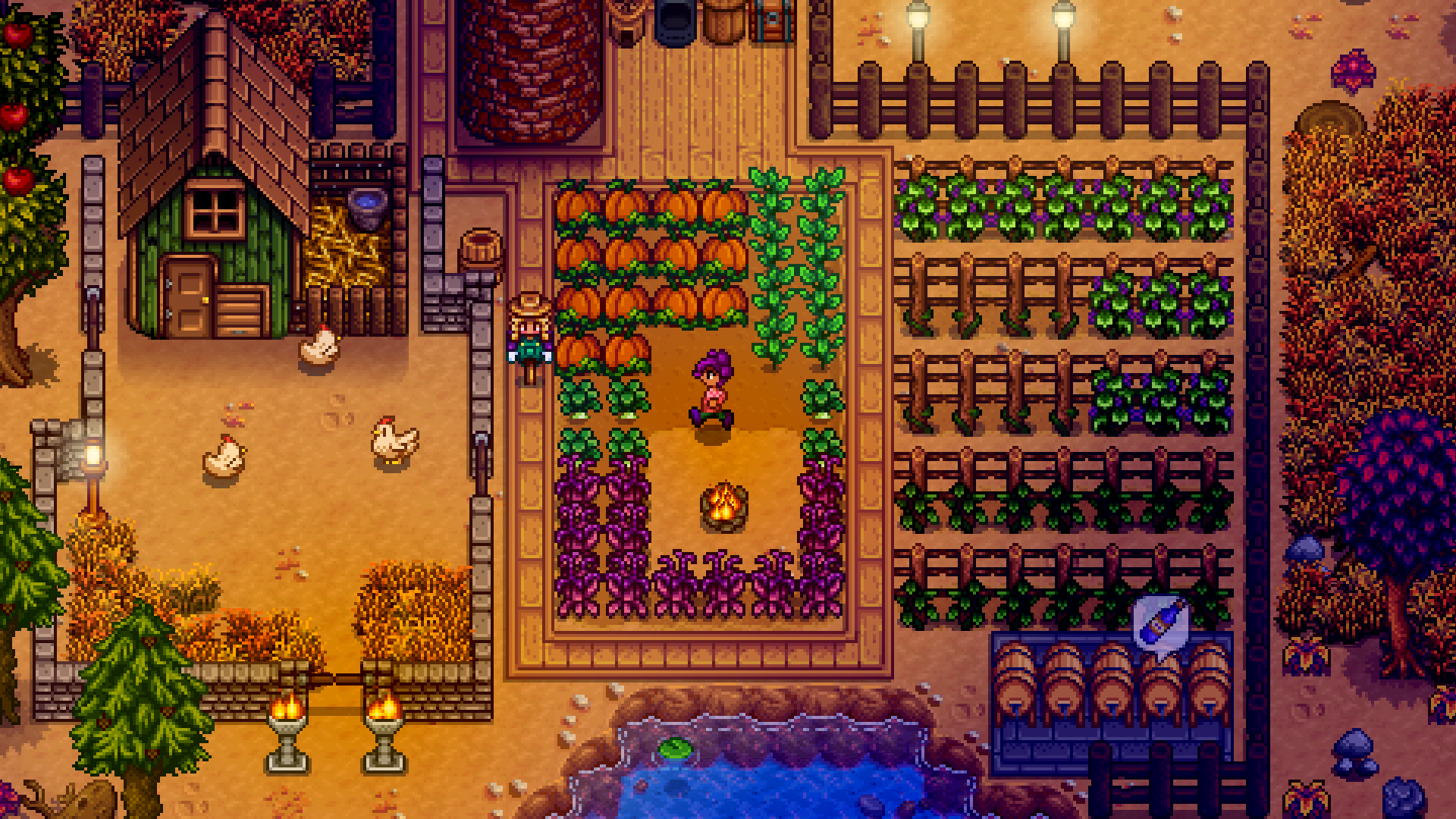Picture this: You wake up at 6 a.m. and eat eggs laid by your chickens. You step outside to tend to your sheep and alpacas and pet your dog. You water the turnips and harvest the cucumbers that hang lazily on their vines. You head to the forest to pick wild grapes and walk up the mountain—past the waterfall where the goddess is said to sleep—to the field where grapes are in season. You greet the carpenter as he sizes up the trees for lumber, and you pick wildflowers for the women in town. The doctor loves tinkering with new herbal tinctures, so you go to his office even when you’re not sick to give him some medicinal plants you found growing wild. You pick up some sugar from the local shop and grape juice from the local winery, and drop by the local bar for a pint of ale. You even have time to bake cookies in the evening, ready to fall into bed and do it all again the next day.
If any of this sounds appealing, you might want to check out a farming game. These games, at their core, revolve around growing plants and raising livestock to earn money. The germinal series, Story of Seasons, has been around since 1996, offering players the opportunity to scratch that agricultural itch through their screens. But while some farming games like Farming Simulator focus on the nitty-gritty of maximizing harvests and yields, Story of Seasons is much gentler. The farm is a conceit: It’s an excuse to drop the player into a picturesque rural community full of friendly faces.
And right now, there’s nothing queerer than moving to the middle of nowhere to commune with nature. Cottagecore, a trend that’s steadily gaining steam on social media, imagines a countryside aesthetic through a queer lens. It celebrates pastoral pastimes—keeping hens, foraging for mushrooms, tending to plants, baking endless loaves of sourdough—as a form of rebellion against urban capitalism. When actually running away from your stifling city apartment is impractical, farming games offer the same bucolic escape that cottagecore idolizes.
When Story of Seasons: Friends of Mineral Town came out in July for the Nintendo Switch, that queerness was made explicit. For the first time in the series, you can romance male and female villagers regardless of your player character’s gender. The dialogue is even different between straight and queer romances. (And there has been some queerness in the series before: The Japan-only release of Harvest Moon DS: Cute in 2005, where you play as a woman, allows you to become “best friends” with some of the women in the village. They move in and raise children with you. This was cut from the 2008 Western releases, as the sheer gal-pal power ran afoul of censor restrictions on including same-sex content in all-ages games.)
At the same time, the cottagecore trend allows us to examine the countryside more critically. Rural communities have long been home to radical collective action: As Raechel Anne Jolie writes in her memoir, Rust Belt Femme, “working-class people are very good at taking care of one another because no one else will do it for us.” LGBTQ2 communities have this same resilience, but the societal perception of the countryside as a breeding ground for bigotry means queer people in real life can be wary of moving to rural spaces. Even as more queer folks move to farms, LGBTQ2 people can still feel invisible, unsafe or lonely. Cottagecore asks what it would look like for communities in the middle of nowhere to accept and uplift marginalized people; farming games answer that. You don’t have to fight. You can just live in a version of nature that’s safe and serene.
“When actually running away from the city is impractical, farming games offer the same bucolic escape that cottagecore idolizes”
But it’s not just the dating and cottagecore vibes that make farming games queer. In almost every single title, your player character chooses to leave an unfulfilling city life in favour of pursuing a romantic idyll in the countryside. Stardew Valley, an indie farming game that has sold 10 million copies since its release in 2016, begins with you wasting away in a cubicle at Joja Corp. Your grandfather left you the deed to his old farm when he died, and one day you get so fed up that you just leave, deciding to pursue “real connections with other people and nature.”
Your character never speaks of your parents or the life you leave behind. Friends, lovers, student debt or shitty apartment leases—they all vanish. It’s a clean break, a physical manifestation of transition; you’re moving from living the life you were supposed to have to living the life you actually want. It’s diving headfirst into risk and starting a new life from scratch where people don’t know anything about you except that you’re new in town.
The steady rhythm of pastoral paradise is the lure of farming games—it’s the promise of a simple, soothing world where there are no monsters to kill or crimes to solve, just people to befriend and animals to raise. You save up money to buy a bigger farmhouse, bigger barns, more seeds for your ranch. You create relationships with people and, if you wish, can eventually get married and have kids—or not. Whereas the similarly cozy Animal Crossing forces you to play each day in real-world time, a farming game day typically takes 20 minutes. It’s easy to play another, and another, and another.
“Cottagecore asks what it would look like for communities in the middle of nowhere to accept and uplift marginalized people; farming games answer that”
Stardew Valley also introduced “player-sexual” dating in farming games. Like the new Story of Seasons game, this means every dateable villager is bisexual and interested in the player character regardless of gender. Male player characters could date jock Alex and goth Sebastian as easily as female characters could romance shy Penny or tinkerer Maru. And there are no limits on how many people you can hook up with: Lani, my Stardew Valley farmer, simultaneously dated every single millennial in the village before finally settling down and adopting two children with Leah, a sculptor and fellow urban emigrant. Considering all the villagers are friends, and some of them siblings, they must have known they were getting involved in a sprawling web of queer non-monogamy… right?
And no matter what game you play, there’s the sense that people are living lives full of yearning—further queering the notion of countryside as a rural utopia. Stardew Valley has a soldier home to his wife, who regrets marrying him so young; the carpenter’s husband is struggling to raise his stepson; two sisters were left behind by their globe-trotting parents and don’t know when they’ll be back.
“The game genre prioritizes community the way queer people do. Found family trumps biology”
Even Story of Seasons, with its child-friendly world, features a couple whose daughter suddenly left, a “drifter” who spends all day praying for salvation and two small children primarily raised by single grandparents. There are only two nuclear families in the town, both of whom have lovely daughters you can woo; every other family has a notable absence, a dead father or wife, a husband gone with no word when he will return or—like you—a solo existence, defined by bonds over blood. The game genre prioritizes community the way queer people do. Found family trumps biology, for you and for so many of your fellow townsfolk.
Of course, there’s nothing to stop you from truly escaping to a farm. Queer farmers have been working hard for decades now to turn build communities dedicated to radical sustainability and rural supportiveness. But if you just want a taste of that life—where you can sell eggs, slowly romance local artisans and help your friends overcome existential sadness—then farming games are here, and queer.


 Why you can trust Xtra
Why you can trust Xtra


